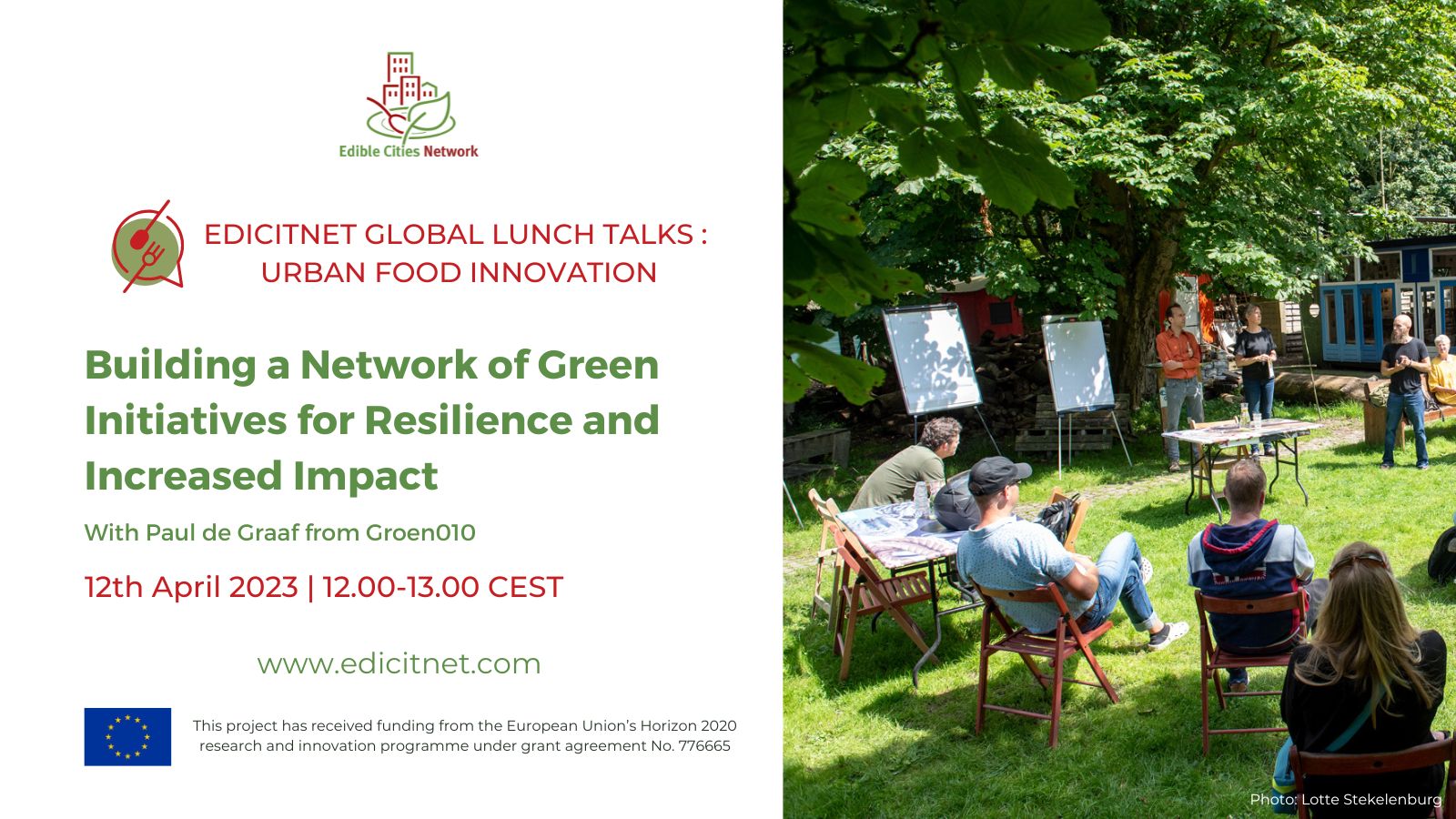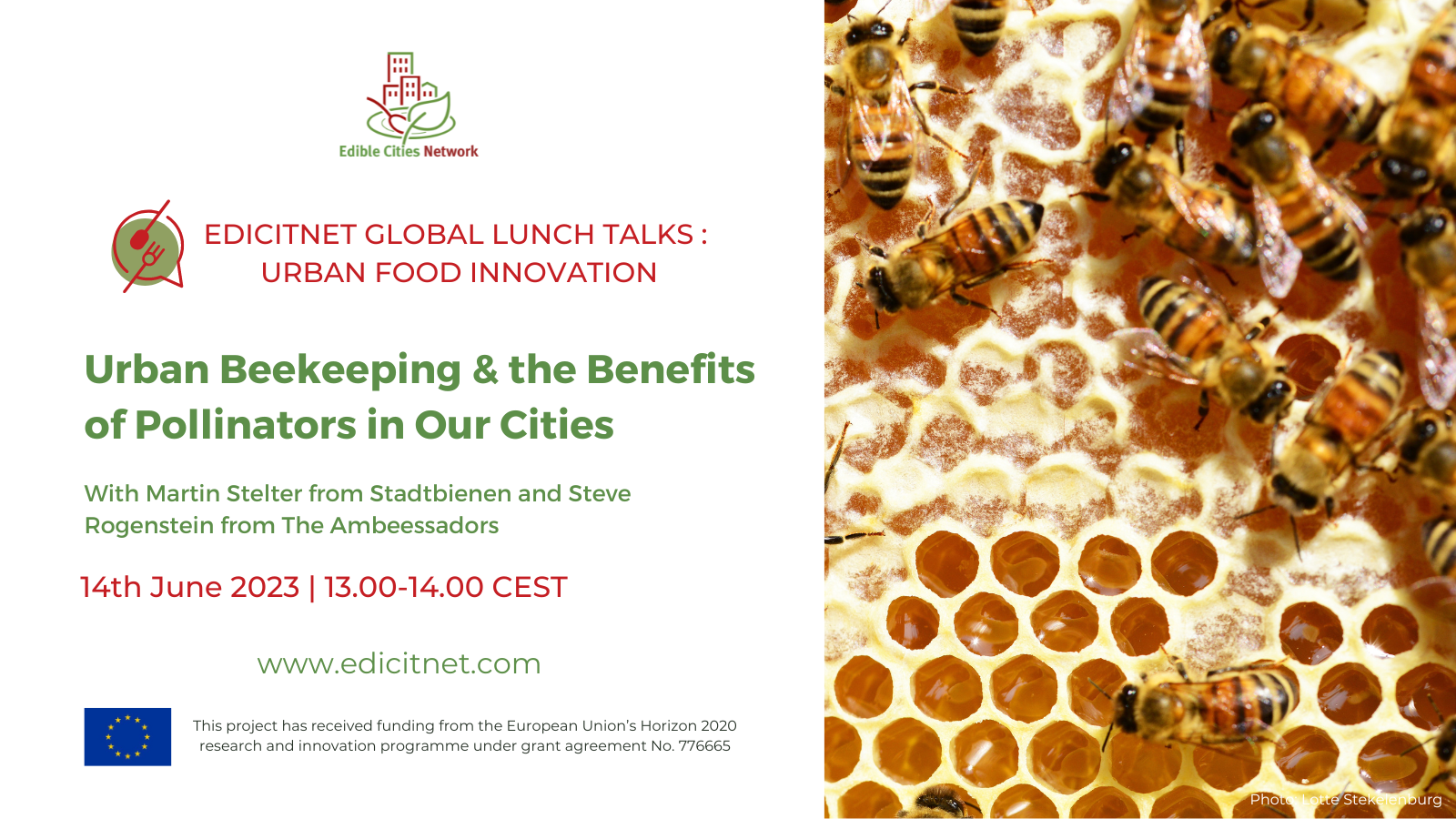Webinar Series – Edible Cities Network Global Lunch Talks
Urban farms, community gardens, city beehives and edible green facades help cities address local food security challenges, boost a sustainable green economy, improve biodiversity and enhance social cohesion by bringing communities together to garden, harvest and share public space.
How can we ensure that sustainable urban food measures like these are successfully integrated into our cities now and into the future?
Although local political, economic and climatic conditions vary widely around the world, cities and independent urban food initiatives often face the same challenges when it comes to implementing these kinds of sustainable solutions, including how to access to available land, how to develop viable long-term implementation and management strategies, and how to successfully balance conflicting interests.
Join our bite-size hour-long, lunchtime webinars, the Edible Cities Network Global Lunch Talks, to explore experiences and insights, challenges, opportunities and best practice cases from different countries around the world.

Information on the next webinar coming soon!
Past webinars
Lunch Talk #1
Integrating Edible City Solutions in Southern China – Best Practices from Guangzhou
13th January 2022

Lunch Talk #2
Making Cities Edible With Building-Integrated Agriculture
9th March 2022
With Rebecca Gohlke and Felix Mollenhauer from Bundesverband GebäudeGrün e.V. (German Association of Building Greening).
Building-integrated urban agriculture – like rooftop farms and edible green facades – offer cities a range of ecological, socio-cultural as well as economic benefits. But what needs to be done to get the city on board? In this 2nd webinar the EdiCitNet project will be exploring legislative and political barriers, but also chances and opportunities. Looking at Germany – and internationally – what can cities and individuals do to support the spread of building-integrated agriculture?
Bundesverband GebäudeGrün e. V. (BuGG) operates both as a professional organisation and an advocacy group for companies, communities, universities, organisations and all parties interested in building greening. BuGG deals with all aspects of building greening, i.e. green roofs, green walls, interior greening and further building structures. Roof gardens, roof farms and edible green walls are part of nature-based ECS that offer ecological, socio-cultural as well as economic benefits.
With Dr Jess Halliday, Senior Associate RUAF Global Partnership on Sustainable Urban Agriculture and Food Systems.
Gender and our food system are inextricably linked. As well as there being barriers to participation in food value chains due to socially determined identities, roles, rights and obligations of women and men, there are also structural inequalities embedded in the system.
The majority of the work carried out to address gender inequalities in the food system has so far focused on rural areas, but there are also gendered disparities in urban food systems, which have remained neglected by those people involved in urban planning.
In this EdiCitNet Lunch Talk, Dr Jess Halliday, Senior Associate RUAF Global Partnership on Sustainable Urban Agriculture and Food Systems talks about the challenges and potentials of applying an intersectional gender lens in urban food systems planning, as well as showcasing some best practice examples from around the world.
Lunch Talk #4
(Up)scaling (Edible) Nature-Based Solutions – Experiences, Opportunities & Challenges
16th May 2022
With representatives from the H2020 NBS projects EdiCitNet,URBiNAT, proGIreg & CLEVER Cities.
In cities, nature-based solutions are actions and policies that use the power of nature to help tackle environmental and social challenges, helping us to mitigate and adapt to climate change and providing benefits to people and nature. But how can urban nature-based solutions be (up)scaled in order to accelerate their uptake and use by actors across society and in countries and cities across the globe?
In this webinar we hear from four EU-funded H2020 projects all exploring urban nature-based solutions – EdiCitNet, URBiNAT, proGIreg and CLEVER CIities – as they discuss and reflect on their own experiences and strategies for (up)scaling nature-based solutions within their projects.
Lunch Talk #5
“Food Connects Us”: How to Join Forces with City Authorities for More Social, Edible Cities
17th May 2022
With the Vic Borrill and Ruth Smart from the Brighton & Hove Food Partnership and Angela Blair, Food Policy Coordinator at Brighton and Hove City Council.
The Brighton & Hove Food Partnership is a non-profit organisation helping people learn to cook, eat a healthy diet, grow their own food and waste less food. They run their own community kitchen, act as a connecting hub for citizens looking to volunteer in community gardens and community food projects, support food banks and help to tackle food waste through a range of different programmes.
The organisation believes that good food is a right for all, brings power and energy to everyone and is a joy to be shared. In this webinar they explore why food is such a meaningful area for cross-city and cross-sectoral partnership, and share how they’ve used food as a galvanising force to build up a close working relationship with their local authority. They reflect on the advantages and challenges of having a non-governmental organisation working closely with the local authority around issues of food, as well as sharing some practical tips for other NGOs looking to build up alliances around food.
With Erwin Nolde from Nolde & Partner Innovative Water Concepts and Martin Regelsberger from the Transition Town Network.
For urban food production and the environment to go hand in hand, it’s important to consider the resources used (water, nutrients, energy, etc) and look for ways to reduce their use by closing loops. This webinar will explore the technological potentials of closed-loop urban agriculture and also present existing examples of technical approaches that are already working well around the world.
In the second half of the webinar, participants are invited to introduce their own urban food production activities and ask for support and advice from the presenters. Based on each case, Erwin Nolde and Martin Regelsberger suggest practical ways in which resources could be sustainably recycled and reused, closing loops and protecting the environment.
Lunch Talk #7
Community Building and Social Programming for Edible City Solutions
14th September 2022
With Helene Gallis, Director of Partnerships and Innovation at Nabolagshager, an Oslo-based think-and-do tank that works with the social aspects of sustainable, urban development.
In this inspiring lunchbreak webinar we will go on a journey exploring different projects in urban agriculture that place strong emphasis on implementing a social programming for their site – creating an enjoyable and attractive place where a sense of community is cultivated alongside tomatoes, herbs and salad greens.
We will see examples of how edible cities can make use of complementary tools that are more commonplace in urban planning, community building and participatory strategies, and that can help to strengthen the social impact. The webinar will show practical and hands-on examples of how we, by connecting edible city strategies with placemaking strategies, can create urban diversity that englobes flora, fauna and people, leading to higher community engagement and more social resilience as well as having a positive ecological impact, highlighted by recent examples from Stensparken Community Garden in Oslo.
Lunch Talk #8
Building a Network of Green Initiatives for Resilience and Increased Impact
12th April 2023
With Paul de Graaf from Groen010 and Coöperatie Ondergrond.
Edible Cities Network Global Lunch Talk #8: Building a Network of Green Initiatives for Resilience and Increased Impact
with Paul de Graaf from Groen010, a democratic association of green initiatives and social green entrepreneurs in Rotterdam and Coöperatie Ondergrond, an organisation that initiates, designs, realises and maintains food forests and edible green spaces based on food forest principles in and around the city.
In Rotterdam, the organisation Groen010 is developing a framework for engaging and organising edible green initiatives in a way that ensures their continuity and improves their positive impact on the city. Join this free webinar to learn more about the democratic and inclusive approach that they have adopted to achieve this and the way that they’re working in collaboration with the municipality to increase transparency and understanding between green initiatives and the city’s administration.
During the session, we will explore the structure of the organisation and its different working groups, as well as highlight the main lessons learned so far. If you’re interested in replicable techniques for making your city a greener and more liveable place by creating a self-organised network of green initiatives, this is an event you shouldn’t miss!
with Martin Stelter from Stadtbienen and Steve Rogenstein from The Ambeessadors
The benefits of having pollinators in the city are many – including higher biodiversity and increased food security thanks to pollination. Join this webinar and learn more about pollinators and why we should make sure to create cities where they feel at home. With a special focus on the European honey bee (Apis mellifera)—probably the world’s most famous and beloved pollinator—the speakers of this webinar will present different ways of integrating these valuable insects into city landscapes: from installing log hives which resemble their natural habitat, to practicing eco-friendly urban beekeeping and beyond.










